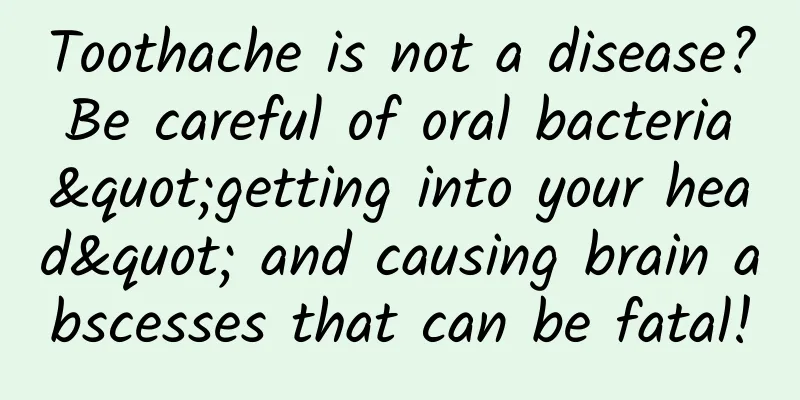Toothache is not a disease? Be careful of oral bacteria "getting into your head" and causing brain abscesses that can be fatal!

|
As the saying goes, "Toothache is not a disease, but it is really painful when it happens." During the just-passed 2025 Spring Festival holiday, the Department of Neurosurgery of Hunan Provincial People's Hospital admitted two patients with brain abscesses due to delayed treatment of toothache. After emergency surgery, both patients were discharged smoothly. Mr. Zhou, 62, from Loudi, Hunan, had suffered from toothache intermittently for three years. Before the Spring Festival, the toothache intensified and made him unable to sleep or eat. However, due to the old idea that "it is unlucky to see a doctor during the Spring Festival", he chose to endure it at home. As a result, the toothache did not heal, and he also suffered from dizziness, headache, limb weakness, and difficulty walking. His family rushed him to the hospital and transferred him to the first neurosurgery department of Hunan Provincial People's Hospital on the day before New Year's Eve. After detailed examination and preoperative discussion, Director Sun Shengli of the First Department of Neurosurgery performed a right parietal lobe lesion removal and drainage operation on him under general anesthesia on February 1. During the operation, the functional area was accurately located, and puncture was performed under the guidance of B-ultrasound. It was confirmed to be a brain abscess, and about 30ml of pus was drained during the operation. After careful care, the patient was discharged smoothly on February 12. (▲Director Sun Shengli's team performs puncture drainage on Mr. Zhou.) Coincidentally, Mr. Li, 70, from Changsha, also failed to receive timely treatment for chronic periodontitis, which led to oral bacteria invading the brain and forming an abscess. He was once in a state of confusion. After surgical treatment by the team of the Department of Neurosurgery of Hunan Provincial People's Hospital , he recovered and was discharged from the hospital. Why does toothache lead to such serious consequences? Director Sun Shengli introduced that the mouth and the brain are separated by only a "wall". Diseases such as caries and periodontitis can cause the gums and alveolar bones to be in a state of inflammation for a long time. At this time, if the immunity is reduced due to staying up late, fatigue, colds or underlying diseases such as diabetes, bacteria will "take advantage of the opportunity" and invade the skull through blood circulation or direct diffusion, causing brain abscesses. Common early symptoms of brain abscesses include fever, headache, and nausea, which can be easily mistaken for colds and delay treatment; when brain abscesses are severe, patients may experience confusion, limb weakness, epileptic seizures (foaming at the mouth, convulsions, etc.), and even life-threatening. Director Sun Shengli reminds : Diabetic patients, those taking immunosuppressants for a long time and the elderly need to pay more attention to oral hygiene. Once toothache or swollen gums occur, they should seek medical treatment in time to avoid the infection from spreading to the brain. Hunan Medical Chat Special Author: Xiao Jie, Department of Neurosurgery, Hunan Provincial People's Hospital Follow @湖南医聊 to get more health science information! (Edited by YT) |
<<: Fever, cough and rash in winter and spring? Be careful of "measles" attack!
>>: Hemorrhoids or colon cancer? Talk about the warning symptoms of colorectal cancer
Recommend
Does an “anti-inflammatory diet” really work? Are foods that claim to be “anti-inflammatory” just a waste of money?
The May Day holiday is over. Many people enjoyed ...
What's wrong with women having no pubic hair?
Many women have less pubic hair, and some even ha...
What does the color of the facial makeup in opera represent? What does the white face in opera represent?
Face painting is a pattern painted on the face of...
Pregnant again 4 months after caesarean section
Every woman has a different physical condition af...
Why do I fart a lot after a miscarriage?
Many girls suffer miscarriages due to unexpected ...
Can I eat chestnuts during menstruation?
Chestnut is a very common dried fruit food. Peopl...
What causes oily hair in women?
In life, many female friends often face the probl...
Common treatments for gynecological diseases
Women's private parts are always fragile and ...
Is it difficult to treat female anti-sperm antibodies?
It is usually difficult for women to get pregnant...
Can I eat donkey-hide gelatin if I have ovarian cysts?
Women will develop many gynecological tumors, inc...
Which is more serious, breast cyst or breast nodule?
The reason for the occurrence of breast cysts is ...
What is the cause of thick and odorous vaginal discharge?
In our female friends' bodies, there is a uni...
Dangerous brain tumor - How much do you know about glioma?
Author: Zhao Zheng, Associate Professor, Beijing ...









